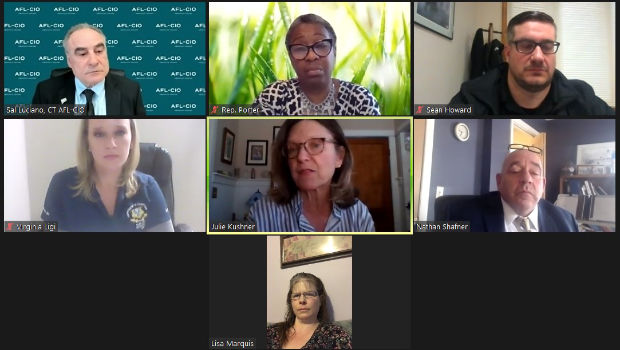Essential workers have been busy on the frontlines keeping Connecticut running throughout the pandemic, yet when they’ve contracted COVID-19 on the job, they’ve frequently failed to receive the workers’ compensation benefits they deserve.
That’s why essential workers and a coalition of labor unions who represent them, including CEA, are testifying in support of a bill that would make the workers’ compensation process fairer to employees. The bill would help essential workers by creating a presumption that they got sick on the job. Their employers could still contest their workers’ compensation, but the burden of proof would fall on management.
State Senator Julie Kushner, co-chair of the legislature’s Labor Committee, said that the signs many people displayed early in the pandemic thanking essential workers were important and heartwarming. “But when it comes down to it,” she continued, “we have to make sure that appreciation and thank yous are not just words. It has to translate into economic support for these families.”
Her co-chair, Rep. Robyn Porter, added, “We don’t get to call them essential workers and treat them like sacrificial lambs being led to slaughter.”
“In the past year, I have spoken to more than 150 members of our organization who have and continue to suffer from the personal effects of the coronavirus and resulting illness,” CEA Legal Counsel Melanie Kolek told legislators. “Nearly every one of them got sick from a known positive contact at their school with no exposure at home or in the community. And almost every case involved the teacher spreading the virus to their family members. Only a handful of claims were accepted and deemed compensable by the workers’ compensation insurer; the rest were denied, or their doctor was reluctant to establish the requisite causation based solely on the history provided to them by their sick patient.”
The effects of COVID can be long-lasting, necessitating long-term care and costly payments for items not covered under health insurance, as well as the loss of considerable time from work. All of these would be covered by workers’ compensation if a claim were accepted, Kolek explained.
Attorney Nathan Shafner pointed out that, unlike a worker struck by a brick at a construction site, employees who contract COVID on the job can have a hard time proving where they contracted the virus. Privacy laws can keep other workers’ medical conditions from being shared, making proving the case that much more difficult.
Shafner said the proposed bill would help injured workers as well their families. “Too often, injured workers are left holding the bag with current laws the way they exist,” he said.
The bill would also increase the funeral allowance, which has remained the same for 34 years, and, at $4,000, is far below that provided in neighboring states.
At a news conference preceding Thursday’s Labor Committee hearing several essential workers spoke out about their experiences contracting COVID on the job and failing to receive workers’ compensation benefits. Some workers who contracted COVID nearly a year ago are still waiting for the benefit.
Sean Howard, a correctional officer, said that he contracted COVID on the job in July of 2020 and because of the infection has a heart condition that he will likely have to manage for the rest of his life. “I can’t play with my young son like I used to,” he said.
“My colleagues in corrections used their own sick, personal, and vacation time while recovering from COVID, even though they clearly got COVID on the job,” he continued. “We can and must do better by all frontline workers.”
Scott Meslow, a nurse at Natchaug Hospital, admitted a patient last March who, two days later, tested positive for COVID. Meslow caught COVID and ended up in the hospital with pneumonia and his organs began to shut down.
“I’ve been dealing with this every single day since,” he said. “Breathing every day is a struggle. Without supplemental oxygen, I wouldn’t be here.”
Meslow described how unfair it is that he hasn’t been able to receive workers’ compensation benefits after contracting COVID at work. “I need workers’ comp. I need to be able to pay my bills, and I don’t know where else to go.”
The proposed bill would be retroactive, qualifying workers infected by COVID-19 at any point during the public health emergency.
It would also prevent employers from disciplining workers who file for workers’ compensation and prevent employers from dissuading a worker from filing or misinforming a worker about how to file. The raised burial benefit would be retroactive for essential workers during the public health emergency.







